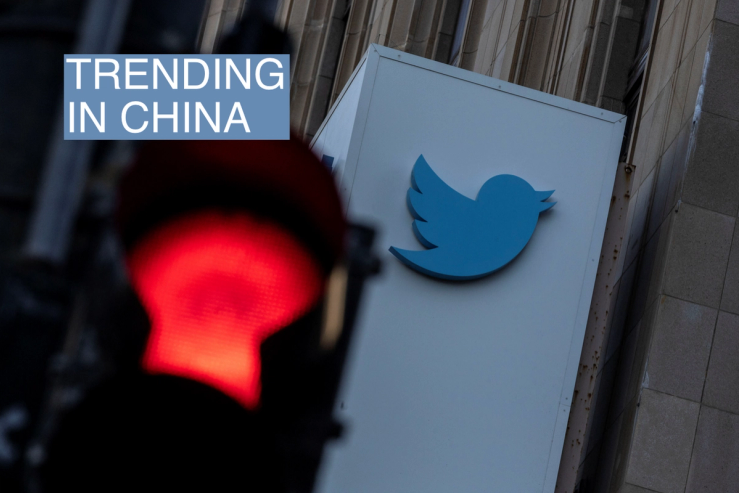The News

When Twitter users searched this week for cities where a wave of historic anti-lockdown protests were unfolding in China, they discovered a flood of sex bots and other kinds of spam.
Instead of surfacing videos of demonstrators, the Chinese-language hashtags for cities like Beijing and Shanghai returned an endless stream of advertisements for escort services, sports betting platforms, and Chinese websites that sell bots and other forms of fraudulent social media engagement.
One Twitter analyst said the amount of spam began increasing dramatically as the demonstrations started. The Daily Mail declared “SEX BOTS are used to curb Chinese Covid protests.” Other news outlets picked up on the story as well, suggesting the Chinese government was attempting to drown out information about the demonstrations on Twitter. The platform had quickly become one of the most-downloaded apps in China’s Apple App Store, despite being blocked by the Great Firewall.
By Tuesday, the deluge was so intense that several hashtags the spammers used trended on Twitter, like #要要定要個要, “must have stability,” and #要搞定個要要, “get it done.” (It’s not clear what, if anything, the hashtags might be referencing.)
Almost all of Twitter’s communications staff have left over the last few weeks, and the company did not respond to a request for comment.
— Karina Tsui contributed to this report
In this article:
Louise’s view
There are lots of good reasons to worry about Twitter’s ability to control Chinese propaganda — but the media narrative here has gotten ahead of the facts.
Kenton Thibaut, the resident China fellow at the Atlantic Council’s Digital Forensic Research Lab, told Semafor the spam resembles previous Chinese state-backed attempts to “flood the zone” and drown out information about subjects the government deems controversial.
But Thibaut said there are also some differences. Past efforts were usually targeted at individuals or groups, Thibaut said, while this spam is impacting wide swaths of Twitter’s Chinese-language ecosystem.
Chinese hashtags for places outside China, like Berlin and London, are also filled with what look like automated tweets promoting sex work, online gambling, and other industries that are largely illegal in the People’s Republic.
These topics are not unusual on Chinese Twitter. One of the platform’s user bases in China is the underground sex industry. A study published in February, for example, found that Twitter has “facilitated the emergence of queer sex influencers and vibrant erotic economies in a country in which homosexuality remains heavily censored.”
Semafor reviewed hundreds of Twitter accounts that used Chinese hashtags for domestic and foreign cities over the last five days. Most followed less than 10 users and had zero followers of their own. But they often shared the same Telegram accounts in their bios, inviting people to contact them on the messaging app.
When Semafor reached out to one Telegram user listed on many of the accounts advertising escort services, they responded quickly. In polite messages written in Chinese, they asked where the potential client was located in Beijing. The account and similar ones could certainly be part of a government sting to root out illegal sex work, but it’s unclear how that might connect to the current protests.
There are also two additional pieces of context about the Chinese spam campaign worth considering. The first is that even well-resourced U.S. social media companies have historically done a more effective job moderating content in English than in other languages. Even if Elon Musk does follow through on his promises to tackle Twitter’s spam and bot problem, precedent suggests he will do a poorer job in languages like Chinese.
The other thing to remember is that people who speak Chinese do the same things on Twitter and other platforms as everyone else, and that sometimes includes looking at porn and engaging in sex work. Exoticizing this content or assuming it is always somehow linked to the Chinese government can obscure the mundane reality.
Room for Disagreement
Alex Stamos, director of the Stanford Internet Observatory and Facebook’s former chief security officer, tweeted Sunday that the spam campaign initially looked like “an intentional attack to throw up informational chaff and reduce external visibility into protests in China.”
But Stamos told Semafor on Friday that while he is still conducting his own research, it’s possible that “Twitter’s spam fighting ability outside of English is collapsing.”
Since Elon Musk first announced he wanted to buy Twitter earlier this year, users have been bracing for what would happen when an authoritarian regime inevitably tried to manipulate the site under his watch. The Chinese government, which researchers have repeatedly accused of running influence operations on U.S social media sites, was often the largest source of people’s anxieties. That’s because China produces about half of the cars made by Musk’s other, larger company, Tesla.
Notable
- Over the last few years, the Chinese government has sentenced more than 50 people to prison for sharing anti-government views on Twitter and other foreign platforms, The Wall Street Journal reported.
- In May of last year, Shanghai officials solicited social media agencies to submit bids for a government contract to create fake accounts on Twitter, Facebook, and other social media platforms, according to documents viewed by The New York Times.

